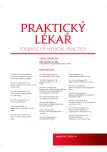Analysis and prediction of the development of the assessment of the degree of dependence for the purposes of the contribution to care for seniors with mental illness
Authors:
T. Pastirčáková; L. Čeledová; R. Odložilík; R. Čevela
Authors‘ workplace:
Lékařská fakulta UK v Plzni
; Vedoucí: doc. MUDr. Libuše Čeledová, Ph. D.
; Ústav sociálního a posudkového lékařství
Published in:
Prakt. Lék. 2020; 100(6): 289-293
Category:
Of different specialties
Overview
Since January 2012 we have been assessing the degree of dependence for the purposes of care allowance according to the ability of assessed person to take care of 10 basic living needs, defined as a summary of individual activities and determined in annex no. 1 in the announcement no 505/2006 Coll. The aim of the communication is analysis of the assessment of the degree of dependence for the purposes of care allowance since 2012 at persons older than 65 years with mental illness. As the result of the assessment of the degree of dependence in the period 2012–2018 there is constant reduction quantity of the assessments of the degree of dependence for mental illness at all age groups, therefore people older than 65 years. There is also a reduction of the cases of dementia. The reason may be the criteria of the assessment, which do not take into account the differences in the progress of the disease at seniors not even a geriatric fragility. Other reason of the results can be statistical mistake. As a third reason we may consider low public awareness about possibilities of social compensations of the health disability in the form of the care allowance. As a conclusion the authors suggest actualization of the assessment criteria of the degree of dependence for assessed seniors, including the people with dementia.
Keywords:
elderly – degree of dependence – care allowance – mental illness
Sources
1. Čeledová L, Čevela R. Doplnění a zpřesnění posudkově medicínských kritérií posuzování stupně závislosti pro účely příspěvku na péči. Čas. Lék. čes. 2016; 155(5): 260–262.
2. Čeledová L, Čevela R. Vývoj a predikce vývoje posuzování stupně závislosti u seniorů s diabetem za nových legislativních podmínek. Geri a Gero 2016; (5)3 : 148–153.
3. Čeledová L, Čevela R. Laskavý průvodce po sociálních dávkách. Praha: Karolinum 2019.
4. Čevela R, Čeledová L, Bienertová J. Posuzování stupně závislosti pro účely příspěvku na péči na základě funkčního hodnocení stavu seniora. Geri a Gero 2014; (3)2 : 82–87.
5. Holmerová I. Soběstačnost a její posuzování v kontextu naší legislativy a praxe – s ohledem na příspěvek na péči. Geri a Gero 2016; 2(5): 75–79.
6. ČSSZ. Interní materiály 2019.
7. MPSV ČR. Posuzování zdravotního stavu pro účely zákona č. 108/2006 Sb., o sociálních službách, ve znění pozdějších předpisů (Posuzování stupně závislosti pro účely příspěvku na péči). Instrukce náměstkyně pro řízení sekce sociálně pojistných systémů č. 15/2016.
8. MZ ČR. Národní akční plán pro duševní zdraví 2020–2030 [online]. Dostupné z: http://www.mzcr.cz/Odbornik/obsah/narodni-akcni-plan-pro-dusevni-zdravi_4114_3.html [cit. 2020-09-29].
9. MPSV ČR. Vyhláška č. 505/2006 Sb., kterou se provádějí některá ustanovení zákona o sociálních službách, ve znění pozdějších předpisů.
10. Wernerová J, Zvoníková A. Využití Mezinárodní klasifikace funkčních poruch, disability a zdraví – ADL a IADL v posuzování stupně závislosti. Geri a Gero 2013; 2 (3): 138–142.
11. MPSV ČR. Zákon č. 108/2006 Sb., o sociálních službách, ve znění pozdějších předpisů.
12. Česká alzheimerovská společnost, o.p.s. Prevalence demence v Evropě [online]. Dostupné z: http://www.alzheimer.cz/clanky/alzheimerova-choroba-ve-svete/prevalence-demence-v-evrope/ [cit. 2020-09-29].
13. ÚZIS. Délka života ve zdraví (Healthy Life Years) [online]. Dostupné z: https://reporting.uzis.cz/cr/index.php?pg=statisticke-vystupy-demograficke-a-socioekonomicke-ukazatele--obyvatelstvo--delka-zivota-ve-zdravi-healthy-life-years [cit. 2020-09-29].
14. Alzheimer Europe. Alzheimer Europe Reports [online]. Dostupné z: https://www.alzheimer-europe.org/Publications/Alzheimer-Europe-Reports [cit. 2020-09-29].
Labels
General practitioner for children and adolescents General practitioner for adultsArticle was published in
General Practitioner

2020 Issue 6
- Advances in the Treatment of Myasthenia Gravis on the Horizon
- Memantine Eases Daily Life for Patients and Caregivers
- Memantine in Dementia Therapy – Current Findings and Possible Future Applications
- Possibilities of Using Metamizole in the Treatment of Acute Primary Headaches
- Metamizole vs. Tramadol in Postoperative Analgesia
-
All articles in this issue
- Health effects of coal combustion
- Use of the toe brachial index to detect lower extremity arterial disease in diabetics
- Listeriosis in the Czech Republic and the European Union – recent situation and the risk communication
- Exercise in the treatment of diabetes mellitus
- Analysis and prediction of the development of the assessment of the degree of dependence for the purposes of the contribution to care for seniors with mental illness
- Laparoscopic inguinal hernia operations in a small hospital
- Polypharmacy and diabetes mellitus in seniors in social institutions
- Selected aspects of out-of-hospital cardiac arrest in the context of the pandemic outbreak of COVID-19 disease
- Factors influencing the quality of life of patients with heart failure
- Jsou překladové a závěrečné zprávy z nemocnic srozumitelné i pro ostatní lékaře?
- Vzpomínka na autora bestsellerů z lékařského prostředí: Paul de Kruif (1890–1971)
- Pracovné lekárstvo. Vybrané kapitoly I
- General Practitioner
- Journal archive
- Current issue
- About the journal
Most read in this issue
- Use of the toe brachial index to detect lower extremity arterial disease in diabetics
- Listeriosis in the Czech Republic and the European Union – recent situation and the risk communication
- Health effects of coal combustion
- Exercise in the treatment of diabetes mellitus
